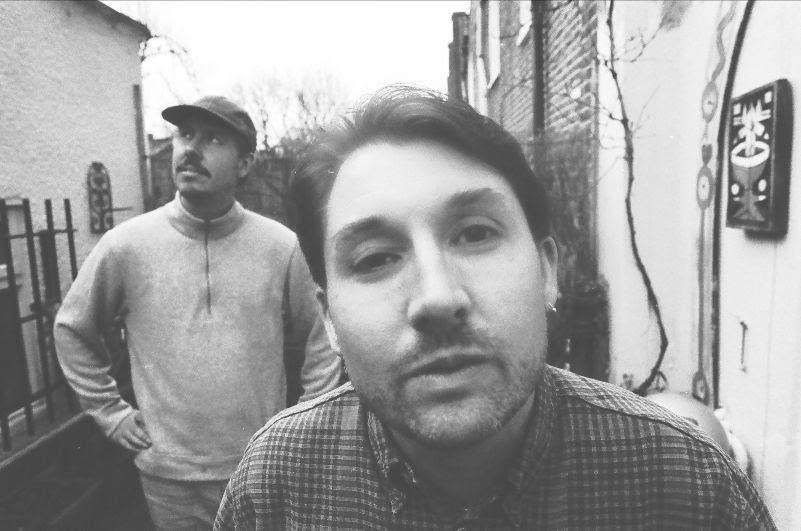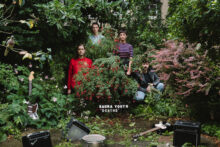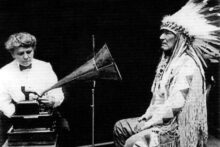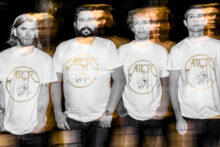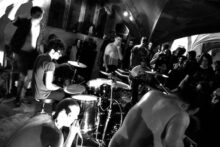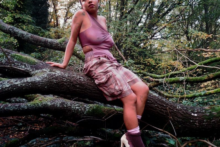Nothing like starting your reviews dispatch with a release that makes you question how you’ve been going about things. It’s Something Looming (Upset The Rhythm/Feel It) by London’s Marcel Wave, who play a garage-rocking strain of post punk with hints of psychedelia and indie pop. Its thematic view, as espoused by vocalist Maike Hale-Jones, is stoutly British, and if her four supporting musicians don’t get strictly weird then their interplay contains depth, and multitudes.
Maybe I should review more things that sound like this album? Maybe more things that sound like this album should be as good as it. Those four musicians come with bona fides: Oliver Fisher and brother Patrick played in Cold Pumas, Lindsay Corstorphine and Christopher Murphy in Sauna Youth, with Hale-Jones’ first on-record feature a spoken word spot on the latter band’s Deaths album. Their keenness to combine short fiction with arch underground rock has been carried on in Marcel Wave, although effervescent organ and cleanly chiming guitar make Something Looming feel more plainly approachable.
Hale-Jones, a published writer, tells stories here while mostly employing relatively conventional rock-lyric meter. ‘Elsie’ is a kitchen-sink sketch larded with pathos, somewhere between St Etienne and Dolly Mixture. ‘Stop / Continue’, a song about decaying former industry, seems to pay homage to ‘Digital’ by Joy Division while building itself around an excellently guileless new wave keyboard. You can also chalk up mentions of Enfield, Bradford, Pontoon Dock and apparently unkillable fast food chain Wimpy (on a song titled ‘Great British High St’), if you like that sort of thing.
Three Glasgow scene gadflies combine in L – that’s the letter L – and release debut LP Marilyn Monroe – All Of Us through Chicago label Radical Documents. Drummer Laurie Pitt has credits on three NWB-reviewed albums by my count (Golden Teacher, The Modern Institute and Green Door’s N.E.E.T compilation), Jack Mellin was guitarist in Spinning Coin and occasionally Sacred Paws. Vocalist Jack Paton might be a genuine eccentric in a world set up to reward fraudulent bores: his major talent is card magic, in fact some people reckon he’s world-class at it, and when I saw L play live he hammered a long metal nail up his nose mid-set, or possibly created the illusion of having done so.
“I’m getting a Laura … I’m getting a Larry … Steve? James? Santa?” Paton burbles on ‘I’m Getting A…’, like a hopelessly bet-hedging medium, over pleasantly plangent piano. In closing the album thus, it by no means erases the free-rock delirium preceding it. Riffs may be spiny, lugworm-slippery or doomladen and sludgy, arrangements sometimes having a post-Stockhausen collage rock air when they’re not approaching quickstep no wave, gruesome electric blues or the sort of cubist hardcore Truman’s Water coined thirtysomething years ago.
With Paton’s blasts of microfiction like Ivor Cutler with a patina of ego-death psychedelic dosage – he’s the frontperson the two musicians needed, and vice versa – Marilyn Monroe – All Of Us will unquestionably madden (in every sense) many who encounter it, but those left standing will be up on tables to salute this one.
Syed Kamran Ali is a known quantity/quality when it comes to music built of tiny details and cherished by tiny audiences, stylistically orbiting noise and improv without those terms quite fitting. The Hunter Gracchus, a Sheffield band in which he featured, were pally with Part Wild Horses Mane On Both Sides and emblematic of a really interesting scene of British weird at the time; absent for maybe a decade, Ali returns as Fish El Fish and with a CD, Dog Wearing Dracula Fangs (Adhuman).
As much as these eight janky jams feel profoundly free, in the sense that no-one’s telling Ali what to do, there’s a distinct humid tension in the way he stacks up electronic loops and his own fucked-with vocals. Occasionally there’s a nod towards programmed rhythms, more often synths stab and scratch subtly at your psyche as Ali recites a slurred-down monologue whose gist you can’t quite catch. He does note that “some men have erections” on track one, ‘Of Incorporeal Holes’, so perhaps start there and work outward. Intermittent blasts of energy (‘At Pops House We Keep Baking’) are outliers, with the predominant vibe a baleful proto-industrial/post-Shadow Ring bleakness that will not make you feel good but may take up residence beneath your skin.
Sound art. What is it? Or rather, do you know it when you hear it? Or when someone tells you they’re making it? Feels fair to suggest there are cultural concerns at play, regarding what gets considered sound art and what doesn’t. Kathy Hinde has certainly put the graft in to earn the right to wield this term, and Twittering Machines is her debut in the album format: an LP released by TBC Editions, Bristol-based like Hinde, its approach – and the results – ably eclipse nagging notions of sound art as something arid and insular.
First conceived ten years ago as an installation, Twittering Machines combines elements listeners will best appreciate if aware of their genesis, and ones which are more base-level pleasurable. From the first category, we hear a Morse code sequence which happens to be a transcript of ‘Ode To A Nightingale’, a poem by Keats. This – likewise the reference to the Paul Klee painting that gives the LP its title – links back to the array of birdsong Hinde includes across this 27-minute piece, all of it created artificially. But it’s when the composer splices together varied electroacoustic elements, with the B-side a mellifluous maelstrom of resonant metal surfaces building to an almost Sunburned Hand Of The Man-like climax, that the composition really catches fire.
Improvisation with soul characteristics, drawn from a London scene that seems to encourage such meetings. This is Crosspiece (Cherche Encore) by vocalist Theodora Laird, who records solo as Feeo, and bassist Caius Williams. They seem to have an established musical buddyship, knocking about at Williams’ Grain night in Bermondsey, but the Arts Council funded this recording regardless, to which I say hell yeah get that paper. Most importantly, Crosspiece sounds like two people having a grand old time making sounds of sincere emotional import.
Williams alternates deftly between basses of the ‘standup’ and ‘guitar’ kinds: on ‘Language (Nearly There)’ he’s on a slowcore tip as Laird emotes in a jazzy R&B register that’s greatly enhanced for letting her speaking accent break through any hint of polish. ‘Eleventh’ gives her a platform to improvise as boldly as her partner, rangy ululations meeting tempered string feedback and hollow-bodied hum – says here it was inspired by Regan Bowering (a sound artist!), which checks out. If the listener has familiarised themselves with her Feeo EPs as they oughta, Crosspiece allows them to appreciate Laird’s creative range as well as the throughline connecting her ‘pop’ and ‘experimental’ modes.
Birdsong: it’s back, and in authentic form this time! That’s what Brighton’s Lau Ro says, anyway – and that this twittering was captured back in Brazil, where the singer-songwriter was born – which is all the proof I need, as the wee buggers do their bit to make Cabana (Far Out) an extra luscious suite of tropicalia experimentica.
Though this is Ro’s debut album under their own name, from 2020-23 they released three LPs as Wax Machine, nominally a band but effectively Ro’s creative vehicle. Flautist Isobel Jones has been retained for two of Cabana’s ten songs, swanning in during the second half of folk fingerclicker ‘Each Day’ and poolside psych shuffle ‘Lugar’. George Lloyd-Owen, a cellist, has the greatest sway over the album’s moods after Ro themselves, lending gravity to ‘Assim’ (that’s the birdy song, so to speak) and feeding back elegantly on ‘Somewhere’.
Self-recorded, per the album title, in a wooden hut at the bottom of Ro’s garden, production is undertaken with a light touch but feels like a careful and deliberate echo of a tranche of records from 60s/70s countercultural Brazil. Listen, though, for incidents of outness which upgrade Cabana from pleasant to engrossing, including the bed of unidentified fuzz on ‘Casinha’ and the guitar/trumpet hoedown that sees out ‘Ensolarade’.
Here’s a big set of technoise gloomsteppers by Weird Weather, a duo trusting their album to the Avon Terror Corps label after a few prior 12-inches. Visceral Snacks weighs in at around 70 minutes once five remixes are added to its initial nine tracks, and is not only released on compact disc but makes attractive packaging from the oft-maligned jewel case.
Laurence Horstman and Duncan Thornley are London-based but plump for ATC-related Bristolian linkups on this album. Italian expat Franco Franco is his normal rowdy MC self on ‘Olive Green’, a speaker cone tester replete with clashing metal synth lines: whether Weird Weather wrote it for him or realised its potential after the fact, good job everyone.
Franco’s production foil Kinlaw remixes the track to bouncy effect later on, and ‘Ring’ – a vocal feature for Anna Homler, and something like a gothic shoegaze spin on Massive Attack in its initial form – is done over by Memotone, another Bristol head, adding what I think is an electric saz. Horstman and Thornley like their drone, dub and even doom metal, with the intro to ‘Friendly Spike’ (which you’ll need to buy the CD to hear!) providing the latter, but default the whole into their own spesh spin on redlined sludgetronics.
Manchester-based Daast’ssecond release also surpasses an hour, and is also giddy for schlocky danceable industrialisms, offering hazelnuts of analogue distortion in every beat. SS24 arrives via US noise label Phage Tapes, whom Daast, aka Chris Williams, has a preexisting relationship with – Primitive Knot, another of his projects (this latest one is his fifth solo alias that I’m aware of), have released a few things on it. Eleven tracks of twilight synthscapes, wounded vocals and ruff kicks, this isn’t Williams’ first foray into techno but SS24 is boshier than he’s ever been.
Opening with its longest cut, the nine-minute ‘Bane Of Rats’, Daast is invariably high-intensity if not especially high-BPM, with hi-hats hitting like clashing swords and jagged basslines feeling like a wilful reshape of power electronics production aesthetics. ‘Yielding Is Life’ cooks up a swirly post-junglist atmosphere – Pessimist, Karim Maas et al – but whacks a galloping girder beat over the top, and that’s far from the only time Williams’ steez here feels attuned to the Perc Trax label’s most punishing output. Having unveiled Daast just before Christmas with a self-issued cassette, his debut live show under that name is happening in Helsinki, of all places, the week after this column’s published. Watch your bassbins, Finns!
The six tracks and 35 minutes of Glory Days (YUKU) is the cue to give overdue props to Alan Johnson, who’ve been releasing consistently interesting takes on eyes-closed dubstep and post-techno in recent years. Mancunian duo Gareth Kirby and Tom Neilan, who’ve been releasing under this name since 2013 (pretty sure they’re named after the Peep Show character and not the Labour right grandee/reactionary arsehole/wrecker of left-wing progress etc), have to be programming some of the most aurally satisfying drums available right now, with all sorts of swish syncopation going on and digitalised congas giving way to flurries of taut-snare breakbeats; I wouldn’t exactly be surprised if Shackleton was a formative influence, but either way Alan Johnson have located a personalised, greatly satisfying take on that sound.
Side one’s three tracks sample Rasta wisdom and/or dub poetry (‘Portal’, possibly my pick of the sextet, features the voice of one Ras Stimulant, taken from this video), before AJ make pop eat itself on side two. The title track’s vocal is pitched up, chopped up – think early-00s glitchy R&B production – and embellished with some Terror Danjah-like steel pan hits. ‘ABAD’ is a heavily-filtered and very 2011-sounding flip of ‘Coming Right Back’ by Razz, the original of which sounds like something you’d hear while shopping for clothes on the high street.
This month’s archive pick is by The Human Aerial, aka Julien Barnell from Reducer – a Northampton band who existed on the fringes of the 1980s anarcho punk scene and played a remarkably prescient mix of heavy, industrial-adjacent post punk and dub/digital reggae. The only way to hear them at the time, it seems, was to catch a live performance, but Reducer recordings have been intermittently pressed up since 2016 by a combination of Barnell’s own label RUSS and Bristol bassheads Bokeh Versions. This 12-inch, seven solo productions titled Antenna, is the latest.
Credited as dating from 1984 to 1991, three of Antenna’s tracks feature in their original forms, with the remaining four re-recorded or remixed by Barnell, who now lives in Brighton. ‘Atone Alone’, which kicks us off, is a concrete hydro dam of PiL bass, Tackhead drums and samples of the “I’m mad as hell” rant from the movie Network, which in fairness may not have been an extremely played-out thing to sample at the time, as it is now.
Dialogue from an Australian documentary on Aboriginal oppression (‘Longtime Land’) and a Southern American gentleman, presumably in court (‘Testi-money’) follow, spicing up proto-acid and breakbeat techno frameworks; Twin Peaks’ Dale Cooper can be found dispensing sagacity on dub-rocker ‘Spotless’. It all holds up very strongly as much as four decades on, making it all the more curious that a sound as radical as Reducer’s appears to have been remembered by no-one at all from the era, save for The Human Aerial himself.

